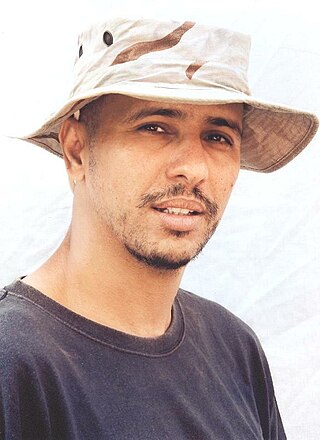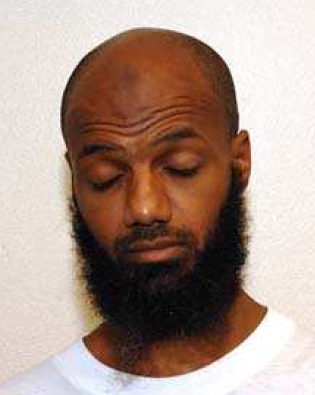Related Research Articles

Khalid Sheikh Mohammed is a Pakistani Islamist militant held by the United States at the Guantanamo Bay detention camp under terrorism-related charges. He was named as "the principal architect of the 9/11 attacks" in the 9/11 Commission Report. He is often referred to by his initials, KSM.

Mohamedou Ould Slahi is a Mauritanian citizen who was detained at Guantánamo Bay detention camp without charge from 2002 until his release on October 17, 2016.

Mustafa Ahmed Adam al-Hawsawi is a Saudi Arabian citizen. He is alleged to have acted as a key financial facilitator for the September 11 attacks in the United States.

Mamdouh Habib is an Egyptian and Australian citizen with dual nationality, best known for having been held for more than three years by the United States as an enemy combatant, by both the Central Intelligence Agency (CIA) and military authorities. He was sent by extraordinary rendition from Pakistan to Egypt after his arrest. He was held the longest at the Guantanamo Bay detention camp as an enemy combatant. Finally released without charges in January 2005, Habib struggled to have his account of his experiences believed, as he alleged he had been tortured by the CIA, Egyptians, and US military, at times with Australian intelligence officers present. For some time, each of the governments denied his allegations, but they have gradually been confirmed.

Binyam Ahmed Mohamed, also referred to as Benjamin Mohammed, Benyam Mohammed or Benyam Mohammed al-Habashi, is an Ethiopian national and United Kingdom resident, who was detained as a suspected enemy combatant by the US Government in Guantanamo Bay prison between 2004 and 2009 without charges. He was arrested in Pakistan and transported first to Morocco under the US's extraordinary rendition program, where he claimed to have been interrogated under torture.

Omar Amer Deghayes is a Libyan citizen who had legal residency status with surviving members of his family in the United Kingdom since childhood. He was arrested in Pakistan in 2002. He was held by the United States as an enemy combatant at Guantanamo Bay detention camp from 2002 until December 18, 2007. He was released without charges and returned to Britain, where he lives. His Guantanamo Internment Serial Number was 727. Deghayes says he was blinded permanently in one eye, after a guard at Guantanamo gouged his eyes with his fingers. Deghayes was never charged with any crime at Guantanamo.
Asif Iqbal is a British citizen who was held in extrajudicial detention as a terror suspect in the United States Guantanamo Bay detainment camps in Cuba from early 2002 to 9 March 2004.
Bisher Amin Khalil Al-Rawi is an Iraqi citizen, who became a resident of the United Kingdom in the 1980s. Arrested in Gambia on a business trip in November 2002, he was transferred to United States military custody and held until 30 March 2007, in extrajudicial detention in the United States Guantanamo Bay detention camp at its naval base in Cuba. His Guantanamo Internment Serial Number was 906. The Department of Defense reports that Al Rawi was born on 23 December 1960, in Baghdad, Iraq.
Richard Dean Belmar is a British man who was held in extrajudicial detention in the Guantanamo Bay detention camp. He was first detained in Pakistan in 2002 and sent to Bagram Theater Internment Facility, then Guantanamo. He was not charged, and was returned to the United Kingdom on 25 January 2005.

Jamil Abdul Latif el-Banna, born 28 May 1962, is a Jordanian of Palestinian origin, with refugee status in the United Kingdom, who had been living in north-west London. He was abducted in November 2002 by the CIA from The Gambia while on a business trip, and suffered extraordinary rendition to Bagram, Afghanistan, where he was held and interrogated by the CIA until March 2003. He was transferred to military custody at Guantanamo Bay detainment camp in March 2003, and held there until 19 December 2007.
Lahcen Ikassrien is a citizen of Morocco who was held in extrajudicial detention in the United States Guantanamo Bay detainment camps, in Cuba. Ikassrien's Guantanamo ISN was 72. The Department of Defense reports that Ikassrien was born on October 2, 1972, in Targist, Morocco.
Extrajudicial prisoners of the United States, in the context of the early twenty-first century War on Terrorism, refers to foreign nationals the United States detains outside of the legal process required within United States legal jurisdiction. In this context, the U.S. government is maintaining torture centers, called black sites, operated by both known and secret intelligence agencies. Such black sites were later confirmed by reports from journalists, investigations, and from men who had been imprisoned and tortured there, and later released after being tortured until the CIA was comfortable they had done nothing wrong, and had nothing to hide.
Nizar Sassi is a citizen of France who was detained by the United States in their naval base at Guantanamo Bay, Cuba. His Guantanamo Internment Serial Number was 325.
The Guantanamo Bay detention camp is a United States military prison located within Guantanamo Bay Naval Base, also referred to as Guantánamo, GTMO, and Gitmo, on the coast of Guantánamo Bay in Cuba. Of the roughly 780 people detained there since January 2002 when the military prison first opened after the September 11 attacks, 737 have been transferred elsewhere, 34 remain there, and 9 have died while in custody.

Mohammed Ahmad Ghulam Rabbani is a citizen of Pakistan currently held in extrajudicial detention by the United States military at the Guantanamo Bay detention camp, in Cuba, since 2004. He has never been charged with a crime, has never had a trial and has been a subject of enhanced interrogation techniques.
Majid Shoukat Khan is a Pakistani who was the only known legal resident of the United States held in the Guantanamo Bay Detainment Camp. He was detained after returning to his native Pakistan to visit his wife and was captured by Pakistani authorities, who handed him over to the CIA. In 2012, Khan pled guilty to conspiracy and the murder of 11 innocent civilians in the 2003 Marriott Hotel bombing in Jakarta, Indonesia, and for the attempted assassination of Pakistan President Pervez Musharraf.

Sharqawi Abdu Ali al-Hajj, also known as Riyadh the Facilitator, is a Yemeni alleged Al-Qaeda associate who is currently being held in the United States' Guantanamo Bay detention camps, in Cuba.
Jawed Ahmad (Jojo) was an Afghan reporter working for Canadian media outlet CTV who was arrested by American troops and declared an enemy combatant, while working with NATO at Kandahar Airport on October 26, 2007.
Mohamed Mazouz is a citizen of Morocco who was held in extrajudicial detention in the United States Guantanamo Bay detention camps, in Cuba. His Guantanamo Internment Serial Number was 294. Joint Task Force Guantanamo counter-terrorism analysts report he was born on December 31, 1973, in Casablanca, Morocco.
The Bush Six are six former officials of the United States government under the presidency of George W. Bush (2001–09) against whom criminal charges were filed in Spain in 2009 by Baltasar Garzón. After appeal of lower court ruling that proceedings could move forward, Spain's National Court dismissed the case for lack of jurisdiction. In closing the investigation, Judge José de la Mata applied reforms to the universal jurisdiction law introduced by the current Conservative government that imposed new limits on the jurisdiction of Spanish courts that require that cases involve suspects who are Spanish citizens or are living in Spain.
References
- ↑ Spanish inmate to be transferred from Guantanamo, The Guardian , 12 February 2004, 4 March 2013
- 1 2 3 "Ahmad Abd al-Rahman Ahmad", Guantanamo Docket, The New York Times, Retrieved 4 March 2013
- 1 2 3 4 Reuters, Ex-Guantanamo Spaniard cleared by supreme court [ dead link ], Washington Post , 24 July 2006, also at Ex Guantanamo Spaniard cleared by Supreme Court Red Orbit Retrieved 4 March 2013
- 1 2 3 "Spanish Judge Calls for Closing U.S. Prison at Guantánamo", New York Times , June 4, 2006
- 1 2 3 "Possible UK link with alleged Islamic terrorists arrested in Ceuta", Typically Spanish , December 12, 2006 Archived January 30, 2007, at the Wayback Machine
- ↑ Al Goodman, "Spain arrests 11 terror suspects", CNN, 12 December 2006, accessed 4 March 2013
- ↑ Javier Jordán, Robert Wesley, "The Threat of Grassroots Jihadi Networks: A Case Study", Terrorism Monitor, Volume: 5 Issue: 3, The Jamestown Foundation, 21 February 2007, accessed 4 March 2013
- ↑ Giles Tremblett (2009-04-29). "Spanish court opens investigation of Guantánamo torture allegations". The Guardian . Archived from the original on 2009-05-02.
- ↑ "Spanish judge opens probe into Guantanamo torture". Agence France Presse. 2009-04-29. Archived from the original on 2012-01-16.
- ↑ Gerald Warner (2009-04-29). "Spanish judge uses memos released by Barack Obama to pursue Bush officials". The Daily Telegraph . Archived from the original on 2009-05-03.